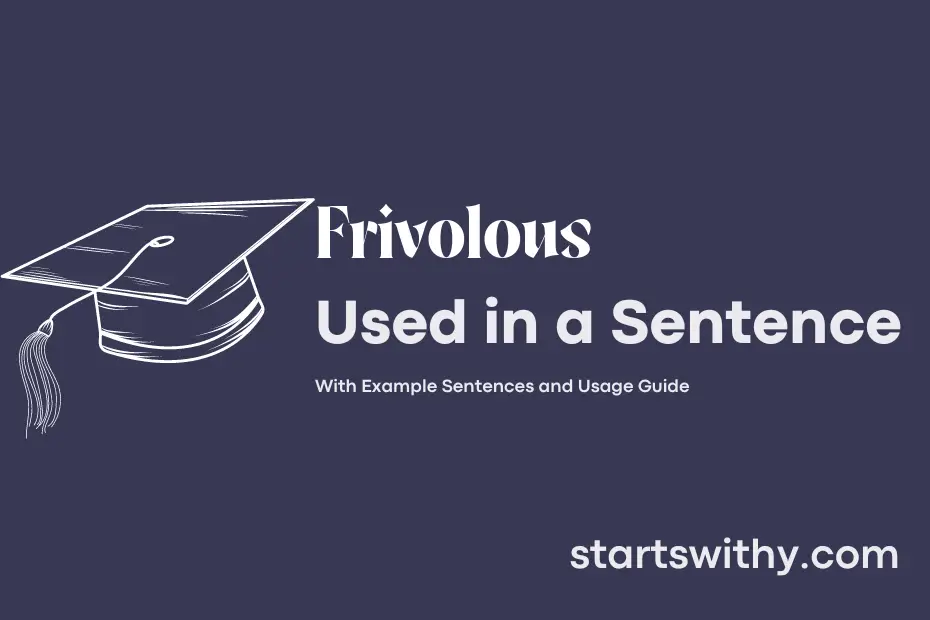Have you ever heard of the word “frivolous” and wondered what it meant? In essence, “frivolous” refers to something that is not serious, important, or sensible, often characterized by a lack of purpose or value.
These frivolous actions, statements, or decisions are often viewed as trivial or unimportant in nature, lacking depth or significance. When labeling something as frivolous, it suggests that it is done in a light-hearted or whimsical manner, without much thought or consideration.
7 Examples Of Frivolous Used In a Sentence For Kids
- Eating candy for every meal is a frivolous choice.
- Buying toys we don’t need is frivolous spending.
- Dressing up in a fancy costume for no reason is frivolous fun.
- Spending hours on a silly game is a frivolous use of time.
- Wasting paper on doodles is a frivolous activity.
- Getting upset over small things is a frivolous reaction.
- Trying to juggle too many tasks at once is a frivolous mistake.
14 Sentences with Frivolous Examples
- Frivolous spending on unnecessary items can lead to financial troubles for college students.
- Some students engage in frivolous debates instead of focusing on their studies.
- It is important to prioritize academics over frivolous activities during the exam season.
- Joining numerous frivolous clubs may distract students from their main goals.
- Spending hours on social media can be seen as frivolous when there are assignments to complete.
- Some students prefer to engage in frivolous gossip rather than meaningful conversations.
- Skipping classes for frivolous reasons can negatively impact academic performance.
- Entering into frivolous relationships can divert focus away from personal growth and development.
- Constantly checking notifications on your phone during lectures is considered frivolous behavior.
- Engaging in frivolous arguments with classmates can create unnecessary tension within the college community.
- Focusing on frivolous fashion trends may lead to overspending on clothes and accessories.
- Using college resources for frivolous purposes can hinder other students’ access to those resources.
- Students should be wary of falling into frivolous peer pressure situations that could harm their academic progress.
- Frivolous spending on expensive gadgets may strain a college student’s limited budget.
How To Use Frivolous in Sentences?
Frivolous means not having any serious purpose or value, being lighthearted or silly in nature. Here is a simple guide to help you use this word in a sentence effectively:
-
Identify the context: Think about a situation, behavior, or action that is not serious or important.
-
Choose the appropriate sentence structure: Use the word frivolous to describe something that is trivial, unnecessary, or not worth serious attention.
-
Build your sentence: Start by introducing the subject, followed by the word frivolous, and then provide details to explain why it is considered frivolous.
-
Examples:
- “She spent all her money on frivolous items like designer handbags and fancy coffee drinks.”
- “Instead of focusing on important tasks, he indulged in frivolous activities like playing video games all day.”
- “The debate quickly turned into a frivolous argument about who was the best superhero.”
-
Practice using the word: Try incorporating frivolous into your conversations or writing to become more comfortable with its usage. Remember, the word is usually used in a negative context to describe things that lack seriousness.
By following these steps, you can confidently use the word frivolous in your everyday language to accurately convey ideas or describe situations that are trivial or unimportant.
Conclusion
In conclusion, the use of frivolous sentences can detract from the overall clarity and impact of communication. When sentences are characterized by frivolity, they often lack substance and fail to convey meaningful information. Instead, frivolous sentences may come across as superficial, distracting, or even unprofessional.
To ensure effective communication, it is essential to avoid the use of frivolous sentences and instead focus on delivering concise, purposeful, and relevant content. By prioritizing clarity and coherence in our writing and speech, we can effectively convey our ideas and engage our audience in a more meaningful manner.



